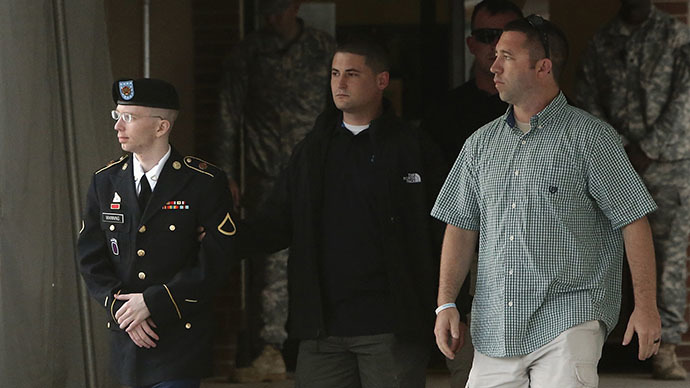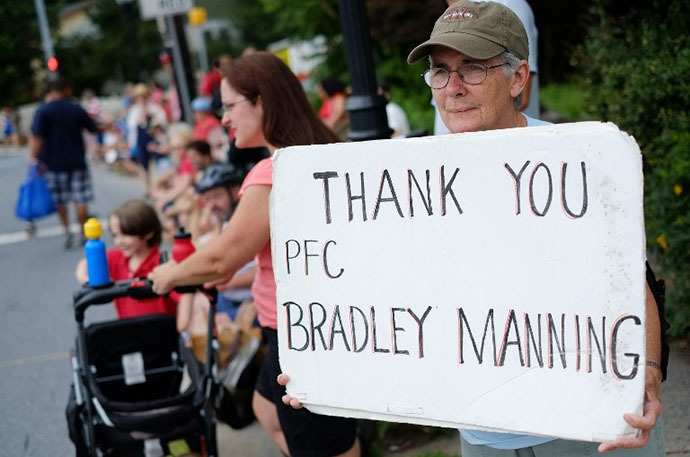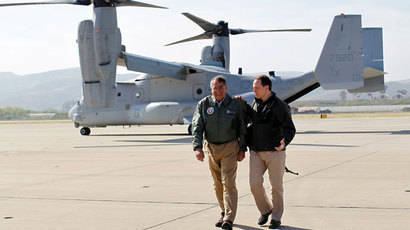Manning defense begins arguments in WikiLeaks case

Lawyers for the soldier at the center of the largest intelligence leak in United States history asked the government to acquit their client on the most serious of charges as the defense began its turn at arguing in favor of the WikiLeaks source Monday.
Six weeks after the military trial of Private first class Bradley Manning began in Ft. Meade, Maryland, attorneys for the Army intelligence analyst opened their case by playing a 39-minute video shared by the soldier with WikiLeaks showing a US Apache helicopter opening fire on civilians and journalists outside Baghdad.
That footage, published by the whistleblower website in April 2010 under the name “Collateral Murder” and considered by many to be a turning point in the Iraq War, is one document among many that government prosecutors say Manning leaked with intent to aid to international Islamist terror group al-Qaeda. The 25-year-old soldier’s attorneys have long attested otherwise, however, and in the wake of the prosecution calling their final witness to testify last week, Manning’s counsel requested Monday that the government drop charges of aiding the enemy and other counts among the two-dozen-plus that have left the Army private looking at potentially a life in prison.
Col. Denise Lind, the presiding judge in the court-martial that’s been more than three years in the making, has until later this week to decide if the court will honor the defense’s request to acquit Pfc. Manning on aiding the enemy, a Computer Fraud and Abuse Act charge, a charge relating to federal larceny and another that has left the soldier accused of stealing the contact info of US forces in Iraq. Meanwhile, the defense began calling their first witness in the courtroom Monday morning, then spent nearly ten hours blowing through a list of other individuals they hope will help their case.
Following weeks of testimony from the likes of roughly 80
witnesses called by the prosecution, the defense opened Monday’s
hearing by requesting those acquittals, then calling soldiers who
worked alongside Manning during his deployment in Iraq to speak
to the conditions in the military unit where the WikiLeaks source
surrounded himself in classified intelligence that he quickly
accumulated and then dissipated to the anti-secrecy website.

Chief Warrant Officer 2 Joshua Ehresman was the first witness called by Manning’s attorneys, and within the course of an hour he attested that the accused soldier was among the best in his rank, even while working in what was painted as a highly disorganized workplace where it seemed far from impossible for classified intelligence to end up in the wrong hands. Manning has previously already admitted guilt in an array of the charges lobbed against him, but Ehresman did not add to the prosecution’s case that the WikiLeaks source went out of his way to share intelligence with the intent to harm his fellow soldiers.
“He was our best analyst by far when it came to developing products,” Ehresman said, going as far as to describe Manning as “our go-to guy” for intelligence analysis, working relentlessly to assist his Army peers even during the time frame when he volunteered intelligence to WikiLeaks.
Elsewhere Monday morning, the defense relied on Captain Steven Lim, Sgt. David Sadtler and Capt. Barclay Keay to detail the circumstances in which Pfc. Manning handled classified intelligence while deployed overseas, then called a one-time Internet pal of the soldier to speak to his character.
Lauren McNamara told the court how beginning February 2009 she spoke over an instant messaging client with Manning and said the soldier often spoke about his desire to run for elected office after his deployment was over.
“He often had interesting things to say about his job and what that entailed and his interest in politics, world affairs and things like that,” she said.
“He seemed to have some very well-informed and complex opinions,” McNamara added, speculating that Manning wanted to “enter the political sphere to effect the change he was interested in.”
McNamara’s testimony came just more than a month after another Internet confidant, Adrian Lamo, testified on behalf of the prosecution. Manning admitted to Lamo in 2010 that he was the source for a handful of WikiLeaks releases, only for Lamo to alert the authorities who ultimately arrested Manning that April near Baghdad. During cross examination at the time, Lamo admitted to defense attorney David Coombs that he considered Manning “desperate and isolated” with the desire to impact the world for the better by taking documents to WikiLeaks.
When the court-martial resumes on Tuesday, the defense will ask
Retired Air Force Col. Morris Davis, a former chief prosecutor
for the Guantanamo Bay military commissions, to weigh in on
whether Gitmo Detainee Assessment Briefs, or DABS, released by
Manning to WikiLeaks caused significant damage. Davis was on the
stand for 90 minutes on Monday before Col. Lind determined that
he could be considered an expert witness on the DABs, but not as
a specialist on national security.














